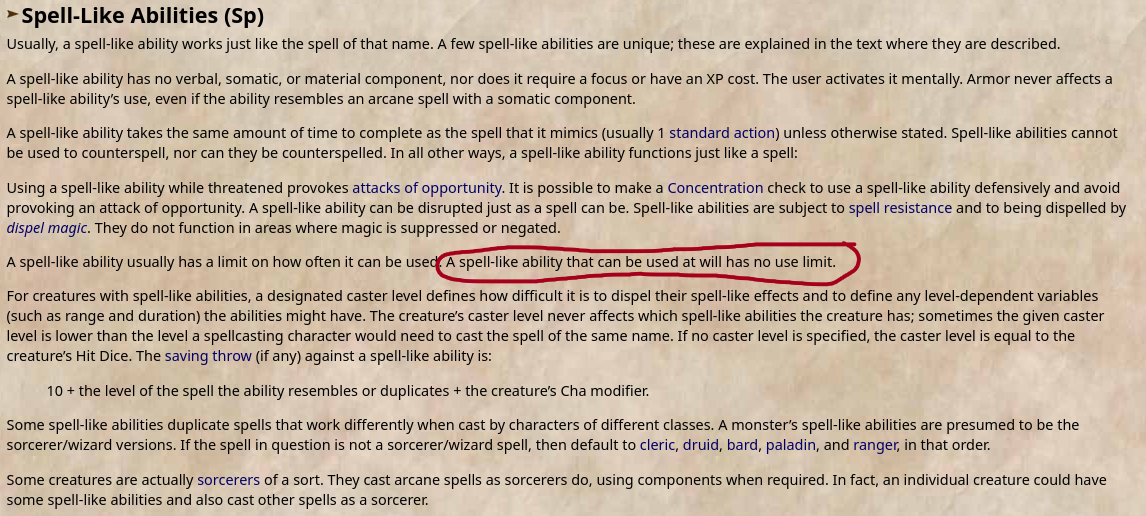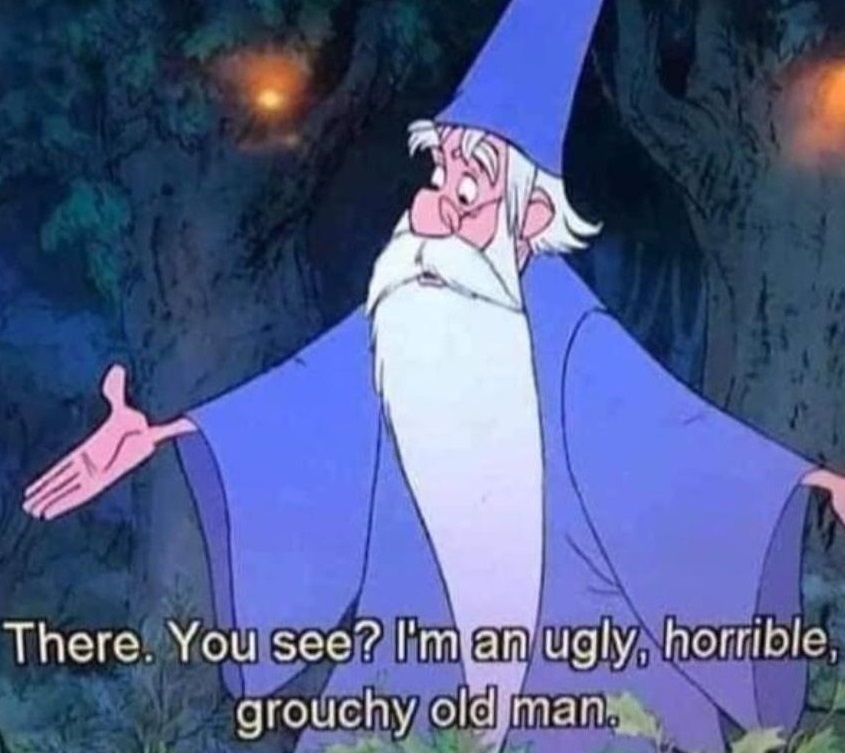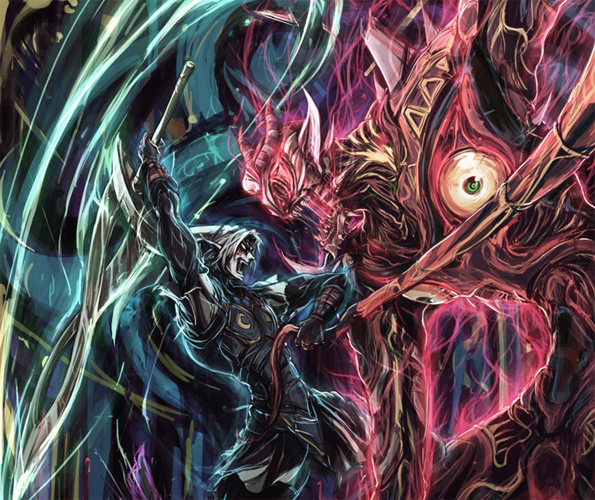Back in 3rd Edition D&D there was a spell called “Holy Word” that could kill non-good creatures within a 40 foot radius of the caster, if the caster was sufficiently high level relative to the creatures. Good creatures were completely unaffected.
When tightly packed you can fit about 2000 people into a 40-foot-radius circle (total area is 5000 square feet). So one casting can deal with the population of a good-sized town. My gaming group speculated for a while about a society where it was a routine ritual to round up all the peasantry and nuke them with Holy Word to keep the population clear of evil. Never incorporated it into any campaigns, though. It’s a bit of a sticky philosophical puzzler.
This is a weird one because despite being a “good” spell, it entails the mass murder of innocent neutrals. It really doesn’t seem like a good action to me.
It seems like anyone who was okay with this would fall to neutral or evil simply by virtue of being okay with mass murder, and in turn fall victim to the Great Neutral Purge.
Indeed, hence the sticky philosophical puzzler. I would think that the clerics themselves would start getting affected by the spell. Fortunately (for them), the effect of the spell when cast on someone of the same level as yourself is only deafness for 1d4 rounds. The Church could probably cover that up.
There was another interesting related situation that came up in an actual campaign I was in, involving the Blasphemy spell (a variant that only kills non-evil targets). My party and I were in our “home base”, a mansion belonging to an allied NPC noblewoman, planning out our next excursion. A powerful demon we’d been tangling with attempted to scry-and-fry us, teleporting in and nuking us with Blasphemy. Unfortunately there were a lot of low-level NPC staff working in the noblewoman’s household and the spell wiped them out instantly… except for one guy, who happened to be of evil alignment. He survived the encounter because of that.
Even though his alignment was evil, though, he’d never done anything wrong and didn’t seem like he had any reason to do anything wrong in the future. So we weren’t sure if we should fire him or what. It wasn’t illegal to simply be evil, you had to actually do something evil before you could be punished. We just warned him we’d be keeping an eye on him, in the end, and kept him on staff.
I’m pretty sure if you aren’t a creature from a celestial plane of evil or good, only your actions define your alignment, not the other way around.
Okay, he hadn’t done anything wrong to us. I guess we could have paused the main campaign to spend a while investigating him, but we were doing one of those save-the-world things so we didn’t have the time. :)
I feel like there might be interesting ways to deal with it. Perhaps the mass killing of neutrals only ever happened the first time, which could have been many generations ago and under singular circumstances. Since then, only the odd one here or there ever dies during the purge. Perhaps it’s been decades or centuries since anyone died to the purge, reinforcing belief in it’s effectiveness as a basis for a pure society. It may have been so long that people wonder whether the purge is even real, or just a traditional ceremony carried out annually based on old myths. Then one year, it wipes out half the city. The party investigates?
The ritual could have been real, but was quietly faked so that a corrupt leader could avoid facing their fate.
Or, the ritual was always fake but used as a cover to assassinate specific targets without consequences.
Yes! And the ambiguity means the DM doesn’t have to decide which it is until the players have deduced certain facts.
whoever is casting that spell into a crowd of peasants will definitely turn evil
Followed by 3 quarters of the party dying to the ritual, most likely.
If they’re high enough level relative to the caster the spell doesn’t do insta-death, it just hurts a bit.
Otherwise the clerics would probably nuke themselves the first time they tried this. Maybe. The ethics of this spell are confusing.
What is being good except having self-imposed restrictions to avoid doing something evil? This spell seems perfect. There will rarely be a time where a good aligned character could justify using it in an overpowered way. If it were inverted then you would see evil characters using it all the time. It’s a self-imposed balance. You have a very powerful tool, but you must avoid using unless absolutely necessary.
Ah, but there is an evil equivalent, Blasphemy. It affects non-evil creatures instead of non-good creatures, and as such has no self-balancing properties. There are even equivalents for Law and Chaos, which are… worryingly abstract.
Hmm, yeah. That doesn’t seem like a great idea to give to people…
Almost as if the whole objective good vs bad system is kinda poorly thought out…
Only good? What about neutral alignment? (if that was a thing)
I hate these filthy Neutrals, Kif. With enemies you know where they stand but with Neutrals, who knows? It sickens me.
Here’s the SRD entry for the spell. It definitely nukes the neutrals.
The evil equivalent is Blasphemy, which nukes all non-evil creatures. Yes, the neutrals get it from both sides.
Then there’s Word of Chaos and Dictum, the Law and Chaos equivalents of those Good/Evil spells. Neutrals, believe it or not, death!
Pick a side, you neutral scum!
Good.
What makes a man turn neutral? Lust for gold? Power? Or were you just born with a heart full of neutrality?
Clinical depression
I have a sunny disposition that’s balanced out with depression. True neutral.
All I know, my gut says maybe.
Well, my parents were worshipers of Ishtar, so I was kind of born into it…
My favorite characters are TN Wizards or Clerics
Here’s the SRD entry for the spell. It definitely nukes the neutrals.
Which is kind of horrifying because most of the population of any given setting is supposed to be neutral. The average commoner isn’t so greatly committed to following airtight moral codes that they’ll ping on a detect whatever spell, whether that’s good, evil, law, or chaos. Cast that on a crowd of randoms and you’ve probably wiped out three quarters of them.
It was a bit different back in the 3rd edition days, “good” and “evil” were slung around a bit more liberally. I believe it wasn’t until the 5th edition when they introduced the “unaligned” state, which is sort of “neutral but without the commitment”, and assumed most average folk were unaligned.
Presumably before the high cleric casts Holy Word there’d be a festival ahead of time in which people are given plenty of opportunity to donate to good causes (ie, the Church) to crank up their good meters before being “tested.”
I feel like the average townsperson would sit between neutral good/lawful neutral.
Implementing a system like that would kill a lot of innocent people and the occasional guilty person.
Accidental realism
Tell my wife I said… hello
Upvoted purely for the Futurama reference.
The ‘both sides are the same’ idiots certainly deserve it
I now want a campaign based on those 4 spells, as swords.
I hate these filthy neutrals. With enemies you know where they stand, but with neutrals, who knows? It sickens me.
What turns a man neutral? Lust for money? Power? Or were they just born with a heart full of neutrality?
Another aspect of the puzzle is that not every evil deserves death. A bum who does minor theft almost as a habit, a hateful bitter man who antagonizes everyone but obeys the law, a teenager, a greedy business person who employs half the town but makes everyone’s life a bit worse, and so on.
Good should have the self restraint to not go straight to murder.
deleted by creator
Right, so anyone who is just somewhat selfish and more concerned about their own well being than others would die, even if they are not actively harming people.
Does the “harm evil” spell affect the now clearly evil cleric who is taking part in genocide?
deleted by creator
On the first cast he’s fine, after that and he’s responsible for breaking up a few families who insist that their loved ones “could never be evil”, he’s wrapped up with the local magistrate for months, maybe it even makes it to the Duke himself.
The second time, after his resentment to the people who caused him suffering, his internal wish that they go as well. He’s fucking gone and you need a new priest.
*Edit- NVM, since the cleric/priest/whatever is the same level as the caster (the same cleric), it’s just making him deaf for a few minutes, that’ll be more of a wakeup call for him maybe.
deleted by creator
a hateful bitter man who antagonizes everyone but obeys the law
As one of those hateful bitter people in the eyes of others who still is lawful, I emphatically tell you that we are evil and absolutely would and should be killed by Holy Word and other such spells.
a teenager
Wait, what?
Actually everyone on your list should be killed by that spell, even the teenager though I vehemently disagree with that.
Like you can sit there and quibble about what is actually evil or not but this is magic, and what matters is what the majority of people consider evil, and they all hit the mark. Most adults are ageist bigots who’d wipe out all teenagers on a dime if they could, for example, even though that’s pretty evil.
Good and evil are honestly pretty meaningless.
That’s what he’s saying, the spell can’t discern between the mass murderer and the lowly thief, the user of that spell should have the restraint to not jump straight murder. Not all evil beings deserve death.
Debatable. I don’t really think the thing is about what people deserve. A sword like that could be used for all kinds of different things, not just some moral crusade.
Hell, I’d use it to detect so-called good people without the stabbing and avoid them. The worst kind of people are good ones. Goodness itself is a kind of evil.
People are quibbling over what is good and evil but no one considers how useful a sword like that would be. D&D already has a hard-coded alignment system with predictable behaviors associated with each alignment so implying good and evil are subjective is meaningless.
Then again, morality itself is pretty meaningless so 🤷
I can’t speak for the mechanics of any game you’ve played as the GM can change these things, but most people don’t treat Good and Evil as being so simple. Most games I’ve been in treat evil as varying degrees of selfishness while good is selflessness. The landlord that mercilessly squeezes the tenants for an extra nickel would probably be evil, maybe not as evil as a vampire who kills to sustain their immortality, but still evil. Just because someone is evil doesn’t mean they deserve death, we don’t execute thieves in the real world.
A magic weapon or spell that can only harm evil people doesn’t mean that you can nonchalantly use it. If you used holy word in the middle of a crowd and killed 30 people who were just shitty people you’d be evil as well. The same goes for using the sword, if you go around stabbing people to see if they are evil it would make you evil.
Not sure how you’d use the sword to detect evil people without the stabbing part, what are you gonna do, tap them with the pommel and see if they felt anything?
Did you seriously say a bum who commits a minor theft deserves the death penalty? Or should I have more coffee?
Having used to be that bum, yes, I can say emphatically what they’re doing is evil by conventional standards. I agree wholeheartedly with what they do, but that doesn’t change the fact that it’s evil and by that game’s standards they should die.
Items like that go by the standards established in the game and that means that homeless dude is gonna die. Conventional western morals dictate he be jailed, at least, and most Americans do want people like that exterminated because they dehumanize the homeless. Even restorative justice types don’t actually view or treat homeless people like humans let alone peers. Homeless populations are pretty universally reviled, and as good and evil always boil down to our feelings and popularity contests, that’s what makes them evil in the eyes of others.
I am not agreeing with the notion, just saying what it is. Personally I think humanity is inherently evil so all humans should die from such an item or a spell. But no one would take my opinion into account so this morality-is-relative crap people are pulling to dispute the veracity of the sword doesn’t hold water either.
deleted by creator
Not to mention being evil does not necessarily mean deserving capital punishment.
A lawful evil farmer might be a dick, but if you stab him the guards are going to have questions.
I’d say “kill ‘big’ evil, stun ‘normal’ evil” would be a better spell.
Situations like this give me the inclination to treat D&D Good™ and Evil™ as physical properties rather than moral tendencies. D&D Good™ that is a little too eager to murder beings labeled as Evil™ falls short of what I would consider good. If someone used such power to kill someone who is a pathological liar and petty thief, that wouldn’t seem good to me even if that person could be classified as Evil™ as the system defines it.
Then again while to me such act seems evil, I don’t think I could call the caster Evil™ because D&D explicitly endorses killing Evil™ creatures as a Good™ act. Since the 1st edition, the purest paragon of Good™ that is the Paladin wields a weapon to kill.
5th edition has done it better with the addition of “unaligned” to the mix, IMO. In order to have an alignment - even a neutral one - you need to explicitly dedicate yourself to that alignment, or be supernaturally bound to it such as with angels and demons. I would rule that these spells don’t affect the unaligned.
It is definitely more convenient for players, especially now that they dropped class alignment requirements, but there is so much worldbuilding tied to Good and Evil and such, it feels a little strange to treat it like something most characters ignore.
Chaotic good Santa Claus?
The sword’s power changes with time, and as it racks up more kills. Soon, it gains a +1 to attack and damage. Then, it can become wreathed in flame as a bonus action. Then, it grants advantage to checks made to locate creatures. Then, its base power inverts and it can only kill non-evil creatures.
Do not tell the player about that last one. Insist to the player that it works exactly as you first described. The Paladin can kill innocent shopkeepers and little old ladies, but cannot kill this assassin working for the BBEG.
Will he question his own stab-first ask-later methods? Or will he turn evil without even noticing?
I personally hate this kind of twist. If you need to actively lie to your player, not just mislead with some clever wordplay, it always feels like you’re breaking trust.
Why explain it in meta, instead of the old trustworthy totally-not-a-witch saying it only affects evil?
Still is a betrayal of trust if the player prices the sword effects are over way then it changes. Video games rarely do this because breaking that trust feels terrible.
It also defeats the point of the exercise. The paladin is nolonger responsible for the murder of those innocents because he was lied to about the true nature of the sword and would have no way to find out the truth without killing an innocent person.
So it’s not the paladin doing the killings, it’s the DM.
I think you missed the point of the exercise.
The Paladin is using the sword in place of a moral compass. They stab people upon first meeting and trust that anyone who dies deserved it. If the sword weren’t good aligned, this would be heinous behaviour.
So make the sword evil. How long does it take for the Paladin to stop doing evil deeds in the blind belief that they’re doing good? Does the Paladin take responsibility for stabbing random townsfolk, or do they try to blame something else for their actions? Does the Paladin just straight up fall to evil, supporting wicked people in the blind belief that they must be the real good guys?
@Susaga @pinkdrunkenelephants you are not getting the real twist. Replace the sword with a fake, completely non-magical one.it doesn’t have to be evil. The paladin only has to believe it only hurts evil people.
I did consider that. I like it not affecting evil creatures cause it might make the Paladin question things if it fails to harm one of the BBEG’s minions. Whether they question which side their on or the sword itself is up to them.
It’s still wrong as it would still be the DM’s fault for manipulating someone else to harm other people.
Or did going full Joker become moral while I was away?
No, you’re not understanding my point. I’m analyzing what’s happening and rightfully blaming the DM for those deaths because they’re his fault.
Would you blame someone if they gave an AR-15 to someone they knew was gonna commit a mass shooting?
…I very much do not understand your point.
You get that, no matter who provided the gun, the mass shooter shouldn’t have done that, right? Even if they thought the gun was only going to fire blanks, they shouldn’t point it at people and repeatedly fire. It’s only manslaughter if they stop at one death, and manslaughter still carries a sentence.
You get that the DM is supposed to cause evil, right? They create monsters and villains and the players have to overcome the evil in the world. The DM isn’t evil because they sent an army of orcs to attack a village, no matter how many villagers die in the assault.
You get that the people in the game aren’t real, right? The DM made them up. Nobody is actually dying, no matter what happens in the game. The morality of the people at the table is not rigidly tied to the morality of the characters they play as.
Just so I know where I’m standing here.
No need to lie, have it start to say stuff after awhile and if the other doesn’t jump to demon sword that’s on them.
I also hate this kind of twist. There better be a great lore reason for this because it’s a huge fuck your playstyle meta reason to do this.
The playstyle is stabbing random townsfolk on the off chance you kill a bad guy. Fuck that playstyle.
And for a lore reason, just have the sword be influenced by the morality of the wielder’s actions. Stabbing random townsfolk is evil. The sword turns evil.
If you know that the sword can’t hurt people that aren’t evil, then stabbing randoms is by definition not evil because you can’t hurt them.
I mean, yeah it’s meta gaming hard and lots of folks wouldn’t want this at their table, so chalk it up as a learning moment as a DM and figure out a good way to take it from them. The obvious one in this case is that the sword damages evil creatures, not destroys. Have our little meta-gaming pally stab a guy twice his level and get wrecked so he rethinks the practice. “Welp you’ve stabbed the bbeg, they’ve stripped you and the party of their possessions and locked you in a dungeon, boy you’re lucky he had somewhere to be or you’d be dead.” Like this is only a clever meta-game if you’re in a video game where you know the level of the zone you’re in and you know the full meta.
And even then, a simple “hey we’re a RP table and we try to keep meta to a minimum, so please reconsider this practice” or “hey before you go stabbing everyone, do you know what the level of each of the characters are? something to think about…” is the polite thing to do before you ruin their game based on the DM’s mistake.
Attacking people is still upsetting even if they don’t get hurt. There are many ways to harass people without hurting them, and I’d consider surprise schrodinger shanking one of them. I don’t know if I’d call that “evil” per se, but I’d definitely call it an asshole move.
Personally as a DM I wouldn’t make the sword evil, but I might make it so eventually it would repel the grasp of the Paladin who used it so flippantly, rather than as a warrior of good.
Oh thats interesting, maybe treat it like an attack condition. Before attack Roll a Dex saving throw to see if your sword disarms itself lol
See this is a twist I like.
First off, a sword that only destroys evil doesn’t mean insta-kill. It just means you only deal a fatal blow if they’re evil. You can just rule that it still damages good characters, so you lose basically all of your allies due to constant wounding.
Second, this is consequentialism vs deontologism. Is the morality of an act decided by the outcome or the act itself? You have the consequentialism view that the action is okay because you know it can only kill an evil person. I argue that the sword’s properties can change without you knowing, so this knowledge is just belief. As the consequences cannot be truly known before the action takes place, the morality is decided by the action itself (deontology). Stabbing people at the start of every conversation is evil.
If I were doing this, I wouldn’t describe the effects exactly (except the +1). I would just tell them it misses every time they attack a non-evil character first, and describe it being wreathed in flames. Then for the swap just tell them who it misses or hits still, but they have to figure out both times what the effect is (or that it changed).
I always go with “this is what you can figure out/read on the manual/some old guy in a pub said” and stick with that, because it feels weird to me to outright lie to players about a game mechanic.
For everything, whether they have it totally figured out or not. I set this expectation in session 0 though, because otherwise the party will spend 6 hours trying to investigate a normal wooden chest because I said “as far as you can tell it’s a normal chest” and they took that to mean “… But there’s more you CAN’T tell”
Maybe it’s just easier to lie… I should try that more often.
As if you aren’t evil by lying to the player.
And as if they won’t successfully dispute it.
Good thing the DM can’t be stabbed by it! How would they dispute it without metagaming? Wouldn’t that be a great plot arc?
D&Dpool breaks the 4th wall!
Does the Paladin trust their blind faith in the weapon, or do they consider the morality of their actions by themselves? Consequentialism vs Deontologism, essentially. The lie reinforces the blind faith to make the situation work.
I put an ethical dilemma in front of a Paladin. I do not consider this evil.
I put an ethical dilemma in front of a Paladin. I do not consider this evil.
No, you knowingly put innocent people in harm’s way because you wanted to get one over on someone. That, by anyone’s standard except yours, is evil. That ain’t gonna change.
…This is fiction. These are fictional innocent people. The fictional paladin played by a real person is doing fictional evil. The real person at the table is just a person playing a game. Nobody is in harms way.
It makes perfect sense. The paladin found the exploit.
Suck to be neutral lol.
deleted by creator
Without lawyers, the kingdom was unable to resolve disputes and fell into chaos.
Although the number of disputes did fall pretty dramatically too
All the lawyers had previously been stabbed.
To be fair, the sword kept nagging him.
“You should draw me, i bet that guy’s really evil” OKAY FINE SWORD-NIMI YOU CAN EAT THAT OLD MAN
Oh hi Nightblood. Where did Vasher go now?
Now throw him a good character with some magic immunity that negates the effect of the weapon.
I mean, that sounds very much like a paladin in unapologetic violation of one or more of their oaths.
I mean… theyre not harming anything good so not really?
But would it kill neutral innocent people?
Are neutral innocent people evil?
I could see a Vengeance Paladin justifying through divine will or whatever
It does sound like Frank Castle living out that one scene in Westworld.
Yea, blatant murder and assault isn’t justifiable to most good deities or codes of ethics, even if the target pings as evil. “Oh this shopkeeper is evil? Guess he dies.”
At the least, it’s highly illegal most places, so even if there aren’t divine consequences there’d certainly be social ones.
Yeah, even when alignment is proof enough you still need trials, and a random person’s magic sword isn’t exactly reliable proof in itself.
Can it fail? Can it be tricked? Is it a magical effect, or a divine one?
What about people who have done horrible crimes but served their sentence?
You can’t expect to wield supreme judicial power just cause you threw a sword at some watery tart.
Supreme judicial power derives from a mandate from the masses, not from some farcical abuse of a magic item. I mean, if I went around stabbing people just because some moistened bint had lobbed a scimitar at me they’d put me away!
Have him stab the mayor who’s evil because he’s greedy and selfish and borderline abusive in trade-deals with neighboring regions but is otherwise beloved (and has rewards heaped on him) because he’s so good at actually keeping order in the town and keeping their goodwill (although probably at least a little bit through some passive-aggressive blackmail). That’s always fun.
Link: The Faces of Evil
COOL, HUH?
I wanna play that game
If one were to base their diet around moral responsibility, would eating only what the blade can cut be reasonable? Can it cut vegetables? Can animals be evil? Would training a cow to be evil in order to avoid starvation be morally justifiable?
Training a creature to be evil so you can kill it is definitely evil.
Okay but if this became common enough that every paladin had a sword that only killed evil things and they also had the restriction that they had to only eat what they killed then it would be a good thing to raise evil creatures as food sources for the paladins, even though the people doing the raising are doing an evil thing.
Then they’re paying to sustain an evil industry, which is itself evil.
I don’t think a cow can be good or evil.
Made me think of Eddie Izzard’s evil giraffe clip
You really need higher cognition for that, although I will grant that even cats on the higher end do understand that they are not supposed to be doing the thing they’re about to do and will simply wait for you to look away or do it really really fast. They’re just not capable of any greater evil that isn’t running across the dinner table.
So now the question becomes how dedicated to evil does one have to be, in order to be evil? Does a life committed only to scratches and bodyslamming others out of the way of free food count, since it’s a life committed only to selfish pursuits?
…I’m pretty sure I had an evil cat once.
A paladin whose diet consists of roast demonflesh. Hm.
TONIGHT… WE DINE IN HELL! TOMORROW, THE UNDERDARK. THAT CONCLUDES OUR ANNOUNCEMENTS FOR THE DAY.
Make an evil dude who’s just immune to stab wounds. Problem solved.
don’t paladins have an at-will detect evil?
or did they take that out in 5e?They do but it’s 1+charisma mod per day uses. The 5e players I know would immediately start stabbing people just to save on resources.
did they change what at-will means in 5e?
cos in 3.5 it means no usage limit, just takes a standard actionlike so

It simply says they can use the feature that often. It never says that it’s an at-will action/feature. “At-will” isn’t even a game term in 5e as far as I’m aware.
fair enough, i’ve only played 5e a couple of times and never as a paladin or gm
Can’t find out without fucking around 😉
Mine just stood stock still staring at people for 24 seconds before starting a conversation, detecting good/evil/law/chaos. Made for some very fun roleplay.
Certified Faces of Evil moment. “This is my Smart Sword!”

























